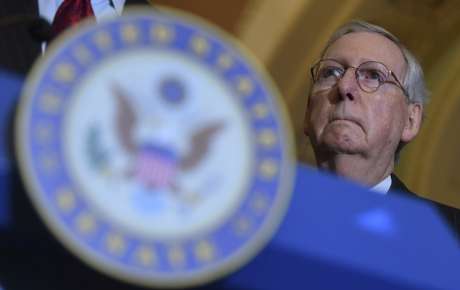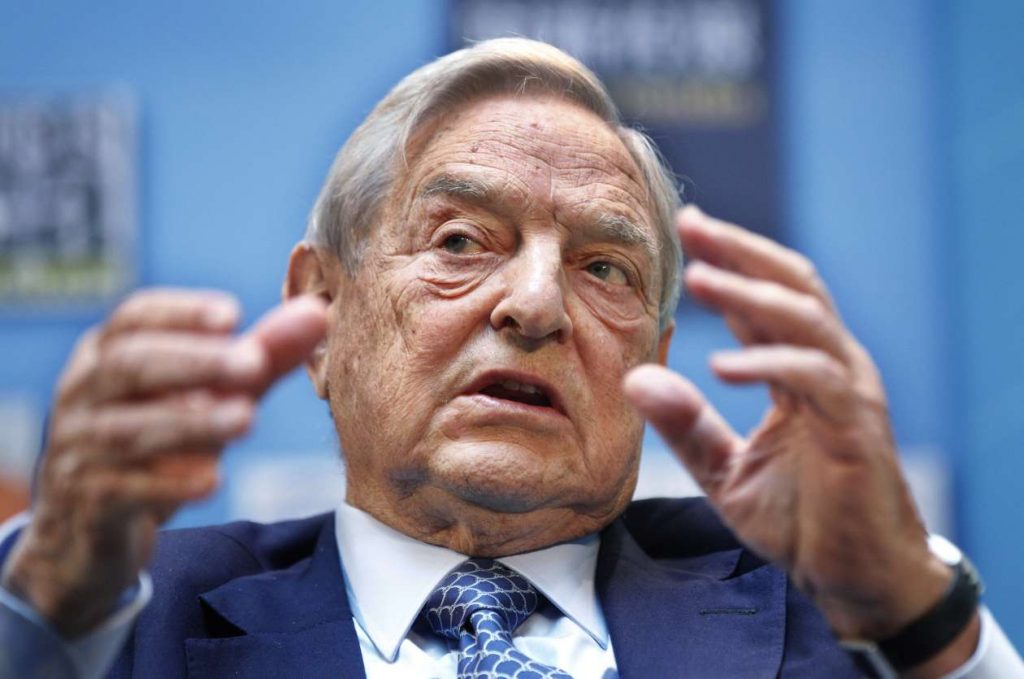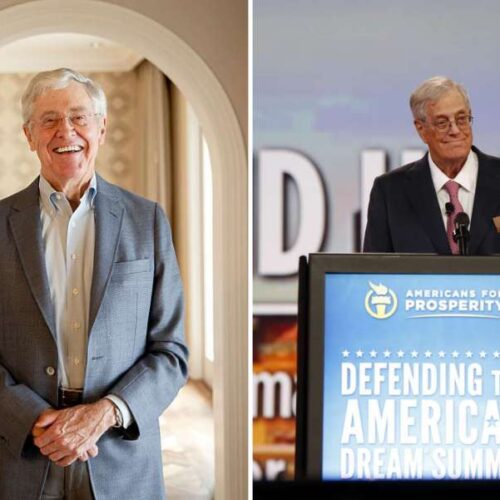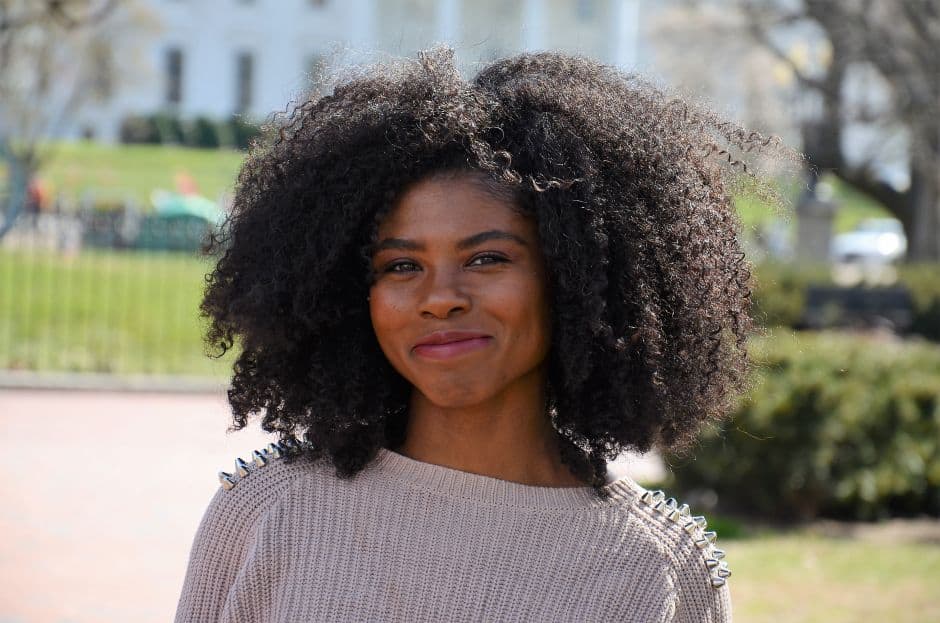A version of this article was co-published by NBC News, Public Radio International and Salon.
Introduction
Billionaire industrialists Charles and David Koch are well-known for pumping tens of millions of dollars into so-called “dark money” nonprofits — groups that actively promote or criticize candidates for office but are not required to reveal their donors.
Not so well known is the duo’s role in underwriting and sculpting the legal landscape that led to the court decisions that made possible these and other groups such as super PACs.
The Center for Public Integrity investigated an array of organizations that have participated in legal challenges dating back 40 years that have resulted in a system allowing unlimited sums to be pumped into modern elections. It’s a system that both Republicans and Democrats now fully rely upon ahead of 2018 midterm elections that could reaffirm — or torpedo — President Donald Trump’s congressional majority.
Throughout that history, Koch-backed groups have stood out as reliable, stalwart opponents of regulation of money in politics. While far from the only players in the legal battle, the Kochs are certainly among the most recognizable — and significant.
“They’re not the only group in the game,” Larry Noble, general counsel for the Campaign Legal Center, said of the Kochs. “But I think what you’ll see, it’s a deep well with a long-term commitment.”
The Center for Public Integrity identified the sources of $293 million received by groups that lodged formal arguments in key campaign finance deregulation cases. It also identified $64 million in funding for groups that defended campaign finance regulations, including significant cash from liberal billionaire and Koch foil George Soros.
Funds underwriting the legal campaigns to shape how money influences politics come from individuals, corporations, unions, foundations and family trusts of all sizes. Some have come from surprising sources, according to tax records, internal documents and other records reviewed by the Center for Public Integrity.
Not all the money identified went toward campaign finance fights, and much of the funding is simply untraceable, since most of these groups keep their donors secret.
But the funding that is known offers key clues about the players behind the greatest unraveling of campaign finance regulation in U.S. history.
‘Buckley’ and Cato
One must travel back in time more than 40 years to understand how today’s motley collection of campaign money laws came to be — and how limits on political fundraising and spending have unraveled along the way.
It began with the Supreme Court’s Buckley v. Valeo decision of 1976, a reaction to Watergate reforms passed by Congress. The court upheld limits on contributions to political campaigns, but in a critical part of the ruling which would play a major role years later, allowed for unlimited spending on campaigns.
The Buckley v. Valeo fight also helped inspire Ed Crane, former national chairman of the Libertarian Party, which was one of the case’s plaintiffs, to create a libertarian equivalent to the predominant think tanks of the day — the liberal Brookings Institution and the conservative American Enterprise Institute.
With $500,000 from Charles Koch, Crane became the leader in 1977 of the Cato Institute, previously named the Charles Koch Foundation. In 1981, it moved from San Francisco to the heart of American political power — Washington, D.C.
Ever since, the Cato Institute has tirelessly fought against campaign finance laws it considered antithetical to its philosophy of small government and largely unencumbered speech.
“We stand against campaign finance laws in general,” Cato Institute research fellow Trevor Burrus said. “We believe that most campaign finance laws are unconstitutional. They are clear impediments of political speech.”
For the Kochs, was Cato an ideological enterprise or vehicle for self-interest? Both, to some degree. Avowed libertarians, the Kochs control a vast empire of heavily regulated companies that would undoubtedly benefit from less government intrusion. Coloring the political system red instead of blue has practical, financial implications for the Kochs, who overwhelmingly support Republican candidates and causes.
The nation’s campaign money system largely stood unchanged until 2002, when Congress passed the Bipartisan Campaign Reform Act — commonly known as the McCain-Feingold Act, named for its two Senate sponsors. The law curtailed a variety of political activities and included a ban on unlimited “soft money” contributions — corporate and union cash — given to political parties.
It also attracted an immediate backlash by foes of campaign finance legislation. Twelve suits brought by more than 80 plaintiffs — were consolidated as McConnell v. Federal Election Commission, named for Mitch McConnell, a U.S. senator from Kentucky and current majority leader, who has long been in favor of liberalizing restrictions on campaign contributions.

Susan Walsh/AP
‘McConnell’ et. al.
Those joined together under McConnell included the National Rifle Association, the Republican National Committee, the National Right to Life Committee, the American Civil Liberties Union, the AFL-CIO, the U.S. Chamber of Commerce and others.
Generally, the backers of these campaign finance case litigants are well-known, but not always.
And some are surprising.
Take the ACLU. Despite its reputation as an unabashedly liberal organization, the ACLU has routinely aligned itself with libertarians and conservatives in recent legal fights against campaign finance regulations. Who are the top donors to the ACLU?
Tops is the left-leaning Sandler Foundation, having given more than $24 million to the ACLU and the ACLU Foundation since 2001, according to the Center for Public Integrity’s review of tax records.
Other known funders of the ACLU’s 501(c)(4) “social welfare” nonprofit arms include the ACLU Foundation; Equal Justice Works; Proteus Action League; GLBTQ Legal Advocates; and the Jewish Community Federation of San Francisco, The Peninsula, Marin and Sonoma Counties. Together, they’ve given more than $856,000 since 2010, tax filings show.
Proteus Action League is an affiliate of Proteus Fund, a left-leaning philanthropic organization. It also creates and oversees grants aimed at limiting money and politics, according to its website. Between 2013 and 2015, the Proteus Fund and the Proteus Action League have together given $306,000 to the ACLU and the ACLU Foundation.
Publishers Clearing House money has infused the LuEsther T. Mertz Charitable Trust, which in turn has contributed more than $6.6 million to the ACLU Foundation for various initiatives, according to the Center for Public Integrity’s review of available tax documents from 2005 to 2015.
The National Rifle Association is prominent for its passionate support of firearms rights, and more recently, the presidential campaign of Donald Trump. But it, too, began supporting campaign finance deregulation in earnest at the time of the McConnell case.
One of the NRA nonprofit’s more notable funders is the Cabela’s Outdoor Fund, a social welfare organization connected to the famous outdoor outfitter Cabela’s, which is also a major firearms retailer.
From 2012 to 2015, the fund gave the NRA $1.3 million. Richard Cabela, the now deceased founder of Cabela’s, was a passionate supporter of the NRA. The company, which Bass Pro Shops acquired earlier this year, had about $4.1 billion in revenue last year, according to its annual report.
Koch-connected organizations have also been quite active.
Cato intervened by filing an “amicus brief” in McConnell, as did the Institute for Justice, a group that got its start thanks to the Kochs.
The Supreme Court, for the most part, upheld the “soft money” and political advertising restrictions of the McCain-Feingold law but struck down the age restrictions on minors’ ability to contribute money to politicians as a violation of free speech rights.
The mixed ruling gave pro-political speech advocates fuel to continue challenging campaign laws, and the chipping away of the reforms began in earnest.
The Supreme Court’s ruling in Wisconsin Right to Life v. FEC in 2007 further eroded the McCain-Feingold law by allowing certain nonprofit groups to air political issue ads within 30 days of a primary election and 60 days of a general election. Wisconsin Right to Life Inc., a nonprofit advocacy group, wanted to run ads that would ask voters to call their senators urging them to oppose filibusters of judicial nominees.
Emerging as a national figure in this case after working for years in lower courts was James Bopp, who was counsel for Wisconsin Right to Life. A bevy of organizations intervened in the case, many arguing for religious freedom of speech. The American Civil Liberties Union, a regular stalwart opponent of limits on free speech, had its say, as did a number of Koch-connected organizations.
Among them, the Center for Competitive Politics (now the Institute for Free Speech), the Cato Institute, the Goldwater Institute and the Institute for Justice.
The Goldwater Institute is a public interest legal organization based in Phoenix, Arizona, named after former U.S. Sen. Barry Goldwater, R-Ariz. Timothy Sandefur, vice president for litigation for Goldwater, said its primary mission is “to defend constitutional principles, through direct litigation and amicus participation.” Donors Capital Fund, the Mercer Family Foundation and the Lynde and Harry Bradley Foundation are among its most generous funders with a combined total of $4.2 million.
‘Citizens United’
In 2010, the Supreme Court ruled in Citizens United v. FEC that corporations, unions and certain nonprofits could raise and spend unlimited amounts of money to advocate for or against politicians. The enormity of the impact of the decision would not be realized for months, even years.
But those who argued the case and participated in it were well aware of its importance. The usual liberal reform groups chimed in, as well as a cadre of Koch-backed crew members, including: the Cato Institute, the Center for Competitive Politics and the Institute for Justice.
A few months later, a federal court ruling in SpeechNow.org v. FEC allowed for the creation of “independent expenditure-only committees” — political groups soon nicknamed “super PACs.” These super PACs could themselves accept unlimited money from corporations, labor unions and even 501(c)(4) “social welfare” nonprofits and business trade associations that themselves could keep their donors secret.
Four years later in McCutcheon v. FEC, the Supreme Court axed limits on how much money a person could give, in aggregate, to political parties, candidate committees and PACs. The practical effect: people are now allowed to directly pump hundreds of thousands of dollars more into party and candidate coffers.
Among the organizations involving themselves in the case? The Cato Institute, the Center for Competitive Politics and the Institute for Justice.
Institute for Justice
The Institute for Justice is a nonprofit, libertarian public interest law firm headquartered in Arlington, Virginia, with satellite offices in states including Florida, Minnesota and Arizona.
It was co-founded in 1991 by former Department of Energy Deputy General Counsel Chip Mellor and Clint Bolick, a former assistant at the Equal Employment Opportunity Commission. Billionaire industrialist Charles Koch provided $350,000 in seed money for the organization.
The Center for Public Integrity combed through tax information for the Institute for Justice and found some of its top donors include the Claws Foundation, Dunn’s Foundation for the Advancement of Right Thinking, Searle Freedom Trust and the Lynde and Harry Bradley Foundation, totaling about $19.8 million since 1998. But the largest donor identified for the Institute for Justice was the Robert W. Wilson Charitable Trust, giving more than $15.5 million since 2003, according to tax records.
Wilson was a notable hedge funder and philanthropist who jumped to his death from his New York apartment in 2013.
Donors Trust, a Virginia-based free-market charity and “donor advised” fund that distributes money to charities across states has been the Institute for Justice’s most consistent supporter.
Tax records show that Donors Trust has contributed to the Institute for Justice every year since 2004, giving it more than $1.6 million. Charles Koch’s foundation is one of the heavyweights that holds an account with Donors Trust. Koch’s organization also directly gave the Institute for Justice $9,600, according to 2014 and 2015 tax records. The David H. Koch Foundation gave $250,000 in 2001, according to records.
The Jewish Communal Fund, another donor advised fund, has given $317,050 to the Institute for Justice since 2010, according to tax records. The John Templeton Foundation, an avid promoter of free market ideas, gave $900,000 between 2013 and 2014, according to a review of tax records.
One of its other generous donors, however, is the National Christian Charitable Foundation, which gave almost $2.8 million since 2007.
This donor advised fund typically gives to Christian churches and ministries with a mission of “mobilizing resources by inspiring biblical generosity.”
The political leanings of organizations such as the Institute for Justice are not a basis of scrutiny for the National Christian Charitable Foundation, and they’re mostly unknown to the foundation, Chief Creative Officer Steve Chapman said.
“NCF doesn’t have any stance on campaign finance issues,” he said in a statement. “We don’t hold positions on such political topics, and we don’t hold stances on whether charities to which we make grants should or should not be active on that issue.”
Richard Uihlein, a wealthy conservative donor who increased his political giving after the Citizens United decision, gave the Institute for Justice $17,500 between 2014 and 2015. But, he wasn’t the only well-known donor to contribute. The Bill and Melinda Gates Foundation, which usually contributes to global health and economic development causes, donated $600.
The Institute for Justice has more than 8,000 donors, said Paul Sherman, a senior attorney for the Institute for Justice who specializes in First Amendment litigation. No one donor provides more than 8 percent of its budget. In its most recent fiscal year, donations comprised more than 96 percent of its income, while the rest came from court-ordered awards of attorneys’ fees.
But that doesn’t mean those donors shape the Institute for Justice’s work, Sherman said.
“IJ’s donors give to us because they support our mission,” he said, noting that the organization has litigated in the same areas for more than over 25 years. “We have never taken a case or passed on a case because of pressure from a donor.”
Other notable contributions to the Institute for Justice include $90,000 from the Dick and Betsy DeVos Family Foundation, which was started by U.S. Secretary of Education Betsy DeVos and her husband in 1989. The foundation has given yearly since 2004, except for 2012 and 2014.
‘SpeechNow.org’ victory
The Institute for Justice notched a win in the U.S. Court of Appeals for the D.C. Circuit in SpeechNow.org v. FEC, a critical lower-court case.
In the case, the Institute for Justice and the Center for Competitive Politics represented David Keating, who now serves as president of the newly renamed Center for Competitive Politics.
Together, the groups questioned whether the federal government had the legal right to make Keating’s SpeechNow.org group register as a political committee — forcing it to adhere to contribution limits for political committees.
The court ruled in SpeechNow.org’s favor, thereby allowing it to raise unlimited amounts of money to independently advocate for or against political candidates. Limits on how much it could receive were found to be in violation of the First Amendment. It was the first time the Citizens United decision was applied in federal courts.
And it gave birth to a kind of political committee that would soon be dubbed a “super PAC.”
Although the Center for Competitive Politics and the Institute for Justice have no formal affiliation, they are “allies in the fight to defend political speech from government regulation,” Sherman said.
Sherman said both organizations have supported each other’s work with amicus briefs, and SpeechNow.org v. FEC was a great match of their strengths.
“CCP’s people had extensive experience with practice before the FEC, and IJ’s people had extensive experience litigating in federal court,” he said. “And we all knew one another. The world of libertarian public-interest lawyers is not huge.”
But the Institute for Justice isn’t always taking up the long, arduous process of going to court. Like other groups that want to provide suggestions and expertise to courts on matters, it has done so through amicus briefs in McConnell, Wisconsin Right to Life, McCutcheon and Citizens United.
The positions that the Institute for Justice has taken on campaign finance issues are made clearer when looking at who funds their endeavors, which include many donor advised funds and conservative-leaning family foundations and charitable groups.
While the Institute for Justice has some history with big money and politics because of its founding relationship with the Kochs, the Center for Competitive Politics can also be counted among the names of Koch beneficiaries.
Center for Competitive Politics
Former FEC Chairman Bradley Smith founded the Center for Competitive Politics in 2005, lamenting the extent of federal regulation on political activity.
The Center for Competitive Politics has waged war against the FEC as litigators, and it has represented others when political free speech is under attack.
David Keating, president of the Center for Competitive Politics, said the organization is simply honoring the guarantees of the First Amendment more so than political ideology or deregulation.
The Center for Competitive Politics prides itself on being part of changing the scope of campaign finance laws since its founding, while noting that there is still more freedom to be sought, especially when it comes to contribution and disclosure rules.
“Our country didn’t have campaign contribution limits until the 1970s,” he said. “I don’t see there’s any evidence that it’s made people we’re electing better than they were before the 1970s.”
Keating said government should make it easier for average citizens to become politically involved and, therefore, it should rethink contribution laws.
While the Center for Competitive Politics has not objected to disclosure by candidates and PACs, it is not in favor of pushing for more disclosure. Doing so, said Keating, would result in more difficult fundraising for groups and misleading disclosure information.
“Disclosure is where a lot of the action is right now,” he said. “That’s going to be in the courts and we may well be the ones representing the plaintiffs.”
Because the Center for Competitive Politics’ mission is the protection of free political speech, its legal argument in Wisconsin Right to Life, McCutcheon and Citizens United cases are just part of that mission.
The terrain of money and politics has the Center for Competitive Politics’ opponents questioning whether its ideals are truly its own — or if it’s just the mouthpiece for its wealthy benefactors.
Although the Center for Competitive Politics does not disclose the identity of its donors, the Center for Public Integrity’s review of tax and other financial records indicates the group is funded by a bevy of right-leaning organizations.
Since 2006, the Center for Competitive Politics has received more than $5.3 million from Donors Capital Fund, $1.3 million from the Robert W. Wilson Charitable Trust and $511,000 from the Ed Uihlein Family Foundation — itself funded in full by Republican megadonor Richard Uihlein — and $440,000 from the Lynde and Harry Bradley Foundation.
As far as its Koch alliances? The Charles Koch Institute gave $20,700 from 2014 to 2015, and the Charles Koch Foundation donated over $57,000 from 2012 to 2015, the Center for Public Integrity’s review of tax and other records shows.
A Koch spokeswoman declined to answer specific questions about the brothers’ giving. In a statement, spokeswoman Tonya Mullins said the Charles Koch Foundation “gives to non-profit organizations and more than 300 colleges and universities around the country that are exploring diverse ideas to meet the challenges of our day.”
The majority of the Charles Koch Institute money goes toward a fellowship program between the Center for Competitive Politics and the Charles Koch Institute, in which both organizations split the cost to pay for the fellow’s compensation, Keating said. The fellowship seeks to groom future free enterprise workers. The Charles Koch Institute provides support for internships and job placement for free-market professional hopefuls.
Keating said the Center for Competitive Politics’ donors give because they’re genuinely concerned with protecting free speech and they have a right to maintain their privacy.
If the Institute for Justice and the Center for Competitive Politics are just mere soldiers in an overall battle plan to charge against reform, their success makes them among the most decorated and skilled in the field.
War on disclosure?
Polls show most Americans agree that the names of political donors should be public information. But Dave Trabert, president of the right-leaning Kansas Policy Institute, does not agree. He has had his own issues with intimidation because of his stances on school choice and tax policy.
“I’ve had to file two police reports over threats of violence,” he said.
Trabert and Cato’s Burrus, like many with right or libertarian views, believe that mandatory disclosure of politically related contributions or contributions to politically active nonprofits is just another form of intimidation.
To support that belief, Kansas Policy Institute filed a collaborative brief with other State Policy Network-affiliated groups, such as the James Madison Institute, FreedomWorks and others, in SpeechNow.org v. FEC.
The Kansas Policy Institute has benefited from Donors Capital Fund and the Charles Koch Institute, receiving $576,000 from the former and $10,000 from the latter.
The State Policy Network is a web of right-leaning think tanks whose benefactors also include the Charles Koch Foundation, the Charles Koch Institute and the DeVos family. It is also affiliated with the American Legislative Exchange Council, another conservative nonprofit that writes model policies for state lawmakers to use.
Carrie Conko, a spokeswoman for the State Policy Network, said affiliate organizations such as the Kansas Policy Institute make their own decisions when determining which issues to pursue.
People within the State Policy Network web will send out emails inviting others to sign on to various issues, said Don Racheter, president of the Public Interest Institute in Michigan and co-signee of the brief with the Kansas Policy Institute.
Racheter said Public Interest Institute signed on because it was something it could do at low cost and in a short amount of time. The group hasn’t done much work on money and politics since, as its focuses on budget, tax and education matters in Michigan.
But others such as the James Madison Institute, another conservative think tank and Koch Institute partner, saw free, anonymous speech under assault and felt compelled to express its views to the U.S. Court of Appeals for the District of Columbia Circuit.
While it also has moved on from campaign finance laws being at the top of its agenda, it still weighs in on the issue of disclosure as it did in a commentary on the matter last year, where it called donor disclosure laws “reckless” and a threat to free and anonymous speech.
The James Madison Institute has received more than $404,000 from the Koch-affiliated State Policy Network during the past 15 years and more than $188,000 from the Charles Koch Foundation from 2007 to 2014, according to tax documents.
Logan Pike, spokeswoman for the organization, said the James Madison Institute will continue to push against disclosure laws, which it sees as an “assault on the Bill of Rights.”
“JMI is committed to defending the rights of all organizations to operate free of government intrusion,” she said.
But intrusion might be what the public wants. A 2015 Associated Press and National Opinion Research Center for Public Affairs Research poll found that 60 percent of Americans say that disclosing donors to all groups would be effective in reducing money’s influence on politics.
That same poll found that 75 percent favor laws requiring organizations that raise and spend unlimited money to publicly disclose their donors.
There are other players who have offered strong campaign finance arguments for the courts to consider — including a few most often associated with liberal causes.
Activists on the left
Left-leaning organizations frequently tout the merits of political disclosure and often fight in court for it.
But they don’t always follow their own advice.
The American Association of Retired Persons fought alongside Common Cause in McConnell v. FEC in support of the McCain-Feingold law. AARP and Common Cause argued that the McCain-Feingold law was a needed tool to combat post-Watergate political scandals and to close various campaign finance loopholes.
Ahead of the McCutcheon case, it teamed up again with Common Cause, the Campaign Legal Center and a host of others, warning of the significance that joint fundraising committees could have and contending that federal campaign finance limits should be upheld for the sake of staving off corruption or the appearance of corruption.
AARP operates a 501(c)(3) charitable branch and a 501(c)(4) “social welfare” branch, the latter which may engage directly in political campaigns.
Issue One, a nonpartisan nonprofit that advocates for reform, does disclose its donors upon request. Like many of its right and left counterparts, Issue One’s donor base largely consists of family foundations with a few donor advised funds intermingled.
William Gray, Issue One’s deputy communications director, said donors aren’t listed on its website because some donors don’t want to be solicited for donations by other organizations. (Gray previously worked as media relations specialist for the Center for Public Integrity.)
Two donor advised funds, Impact Assets and National Christian Foundation, gave Issue One $372,500 and $1,000, respectively. The original sources of these funds are not publicly known.
Hewlett-Packard co-founder William Hewlett’s William & Flora Hewlett Foundation has given at least $400,000, and the Rockefeller Brothers Fund Inc. has given $40,000.
Jonathan Soros is the son of Democratic mega-donor George Soros and a prominent Democratic funder in his own right, contributing to dozens of different liberal candidates and political committees, according to FEC records analyzed by the nonpartisan Center for Responsive Politics.
According to the Center for Public Integrity’s review of tax documents of organizations that filed pro-reform briefs to the courts, the Jennifer and Jonathan Allan Soros Foundation has donated $508,000 to other allied groups, such as the Campaign Legal Center, Common Cause Education Fund and the Brennan Center for Justice.
But that’s just a fraction of what Jonathan’s father, billionaire tycoon George Soros, has given to some of the same institutions. George Soros’ Open Society Foundations, formerly called the Open Society Institute, has shelled out more than $9.4 million to these groups, including the Brennan Center for Justice, Campaign Legal Center, Common Cause, Public Citizen, the League of Women Voters and Democracy 21.

Manuel Balce Ceneta/AP
George Soros’ foundation has also given to groups that stood on the opposite side of campaign money reform, such as the ACLU Foundation and Alliance for Justice. Open Society Institute has given $19.8 million since 2001 to the ACLU Foundation. It’s given $1.1 million since 2002 for Alliance for Justice.
The money went toward a variety of issues on which the groups work, such as judicial nominations and public education reform. Millions of dollars went toward general support.
These groups vary on what they disclose about their donors.
The Campaign Legal Center lists all its donors — past and present — on its website, but does not provide specific donation amounts. Based on available tax data, the Ford Foundation has given $2 million to the Campaign Legal Center for its pro-reform work. The Stuart Family Foundation has also shelled out almost $1.9 million, beginning in 2004. Other notable donors include the Rockefeller Brothers Fund Inc. ($254,700) and Brennan Center for Justice ($140,000).
Most of the Brennan Center for Justice’s donors can be found in their annual publication, Democracy & Justice: Collected Writings. The 2016 edition of the publication lists the Laura and John Arnold Foundation, The JPB Foundation and Open Society Foundations as donors that have given $1 million or more. Open Society has given nearly $6 million to Brennan since 2002. It can also count the Rockefeller Brothers Fund Inc. and the Jennifer and Jonathan Allan Soros Foundation among its funders, totaling $880,000. The Craigslist Charitable Fund has also given the Brennan Center for Justice $375,900 since 2010.
(The Center for Public Integrity has received funding from the Open Society Foundations as well as the Ford Foundation, the Hewlett Foundation, Laura and John Arnold Foundation, the Rockefeller Brothers Fund Inc. and the John D. and Catherine T. MacArthur Foundation. A complete list of Center for Public Integrity funders can be found on our website.)
Daniel Weiner, senior counsel for the Brennan Center, said he thinks electoral politics and issue advocacy don’t carry the same weight when it comes to election influence.
“I do think a lot of us in the [nonprofit] community need to wrestle with that,” Weiner said. “If you’re trying to get people elected, you should disclose.”
Common Cause and the League of Women Voters, both 501(c)(4)s, aren’t required to disclose their donors, but they both have 501(c)(3) branches, Common Cause Education Fund and League of Women Voters Education Fund.
Lloyd Leonard, senior director of advocacy for the League of Women Voters, said the league would be happy to disclose its donors if every other organization like it were required to also. The League currently doesn’t disclose donors to its 501(c)(4).
“You have no way of really verifying what I’m saying to you because of the dark money system,” he added.
The John D. and Catherine T. MacArthur Foundation and Craigslist Charitable Fund were the largest donors the Center for Public Integrity identified for the League of Women Voters Education Fund.
The Sunlight Foundation is perhaps the most transparent, naming donors and listing amounts given.
Keating of the Center for Competitive Politics scoffs at pro-campaign disclosure reform organizations that don’t disclose their own donors.
“If it’s such a good idea, why aren’t they doing that already?” he said.
Has the campaign finance battle already been won?
So how much sand is left in the campaign finance sandlot since the Citizens United, SpeechNow.org and McCutcheon cases have been fought and won by the campaign finance deregulation advocates, including the Kochs?
Disclosure is a fight that continues to rage, but there are few prospects — in Congress or federal courts — for major campaign money reforms that would tighten regulation.
Richard Briffault, professor of legislation at Columbia Law School, sees reformers on the defense for the foreseeable future, given that Republicans are in control of all branches of government until at least 2019 and the White House until at least 2021. Meanwhile, Republicans may further roll back campaign finance restrictions.
“It wouldn’t surprise me if some of the limits on the donations are eliminated or raised and some of the restrictions on collaboration can be weakened,” he said.
But Bopp, the conservative lawyer central to several key campaign finance deregulation fights, isn’t so sure.
“The courts have upheld contribution limits under certain circumstances, so that’s what makes that litigation more difficult,” he said.
Bopp added that the fight for free political speech has otherwise largely been won.
Briffault’s concerns are parallel with liberal-leaning organizations that have now switched their focus from campaign finance reform to other issues of the day, such as gerrymandering, immigration and voting rights.
Refocusing attention is a matter of recognizing when you have the potential for change, which seems unlikely for campaign finance reform, said Michael Macleod-Ball, former manager of the ACLU’s federal advocacy office who now works in a consulting capacity for it.
Macleod-Ball said there are a number of factors that determine an organization’s priorities, such as considering what debates the public is having and what policies are directly affecting people’s lives.
“As a result, I think campaign finance reform or anything having to deal with campaign finance reform or disclosure is a relatively small priority compared to other things that are definitely occupying ACLU resources,” he said.
Ashley Balcerzak, John Dunbar and Dave Levinthal contributed to this report.
Read more in Money and Democracy
Elections
Mystery money floods Alabama in Senate race’s final days
Super PACs backing both Roy Moore and Doug Jones are exploiting legal loopholes that allow them to hide their donors
Elections
Watchdog demands Federal Election Commission crack down on fine-dodging nonprofit
The agency should sue the 60 Plus Association, says Citizens for Responsibility and Ethics in Washington








Join the conversation
Show Comments